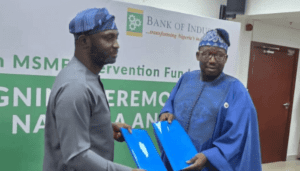
CIBN holds forum on capacity building for young professionals
By Seun Ibiyemi
The Chartered Institute of Bankers of Nigeria (CIBN) says it is introducing human capital development fund to retrain, build capacity and help young professionals in the banking and finance industry to grow their career.
The President/Chairman of Council, CIBN, Dr Ken Opara, said this at a pre-conference media briefing on the maiden edition of the CIBN Generation Next Forum, scheduled for Aug. 3, to be held physically in Lagos and virtually.
The maiden edition of the Generation Next Forum is aimed at empowering and inspiring young professionals, especially the Gen-Z and millennials in the banking and finance industry.
He said that such capacity building would help to mitigate the effects of departure of employees, while those that remain would regain and build their interest.
The event will have the theme, “Industry 5.0 Banking Revolution: Insights for Generation Next.”
Opara said, “Once we build capacity, and the youth understand that they have a future, they have a career that they can look up to, obviously the attrition level will be reduced.
“But more importantly, the institute has championed the development of human capital development fund which is meant to build capacity and help the younger ones to build their career,” he said.
He said that the forum would have subject matter experts come to address the issue of capacity gaps.
According to him, they will build capacities, train, retrain and help the younger ones to discover their relevant potential in key areas such as fintech, financial services, and small businesses, among others.
Opara said that there would also be a coaching and mentoring clinic, where people would have issues bordering to their careers and businesses answered by experts and practitioners.
He said this would inspire people within and outside the country to continue to have hope in the country and to see the opportunities in Nigeria.
Opara said, “The generation next forum will also provide a robust platform for stakeholders to examine the criticality of the Fifth Industrial Revolution and its profound impact on the banking and finance industry, especially as it affects the young generation.”
According to him, this has been a cardinal focus of his agenda as the 22nd President and Chairman of council of the institute.
“From available statistics, Nigeria has the largest population of youth in the world, with a median age of 18.1 years. About 70 per cent of the population are under 30 and it is not controvertible that the future belongs to this segment of the population.
“We believe that the future is now, as such our focus is to attract, groom, mentor, prepare and collaborate with this special segment to get them ready for the task ahead,” he added.
Opara said that the forum would bring together over 5,000 participants, comprising majorly Gen-Z and Millennial participants, decision-makers, operators, and other key players within the financial services ecosystem.
He said the event would serve as an avenue for tech enthusiasts to showcase their innovative ideas, foster collaborations, and explore opportunities that arise from the convergence of technology and finance.
He, therefore, expressed the confidence that the forum would inspire a new generation of banking professionals, facilitate knowledge sharing, and foster the development of innovative solutions to address the challenges in the society.
Chairman of the Planning and Organising Committee for the Generation Next Forum, Mr Nath Ude, said that the forum would essentially provide mentorship opportunities for talented youth who are eager to carve a path towards becoming future banking professionals.
Ude, who is the Managing Director, Nova Merchant Bank, also said that Gov. Babajide Sanwo-Olu of Lagos would be the Special Guest of Honour at the forum.
He named other distinguished thought leaders to speak at the plenary session as Reeta Roy, President/CEO, Mastercard Foundation; Iyin Aboyeji, Founding Partner, Future Africa; Eizu Uwaoma, Founder and CEO, Hexavian Group.
Others are Expansion Strategist and Operation Lead. Paystack Payment Ltd., Nefe Etomi; Founder/CEO Gemstone Group, Fela Durotoye; Founder, uLesson Educational Ltd., Sim Shagaya; CEO of Stanbic IBTC Financial Services Ltd., Stanley Jacob; President Fintech Nigeria, Ade Bajomo; and Managing Director/Co-founder, Indicina, Yvonne Johnson.



